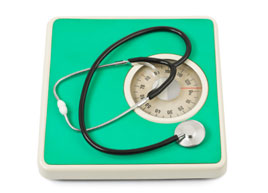Most people put on weight because they eat and drink more calories than they burn through everyday movement and body functions. But in some cases, your weight gain may be due to an underlying health condition. Here are nine medical reasons that can cause weight gain.
 1. Underactive thyroid
1. Underactive thyroid
An underactive thyroid (hypothyroidism) isn’t producing enough thyroid hormone — a hormone instrumental in balancing your metabolism. That slow metabolic rate means whatever you’re eating could be stored as fat rather than converting into energy
2. Diabetes treatment
Weight gain is a common side effect for people who take insulin to manage their diabetes. Insulin helps to control your blood sugar level. It’s not uncommon for people with longstanding diabetes to eat a diet that "matches" their insulin dose, which can mean they’re eating more than they need to in order to prevent low blood sugar – also known as hypoglycaemia or "hypo" – from developing.
3. Stress and low mood
People respond differently to stress, anxiety and depressed mood. Some people may lose weight, while others may gain weight. Weight gain from depression can make you more depressed, which can lead to further weight gain. If you know you’re an emotional eater, you need to find other forms of distraction, such as exercise or a hobby, calling a friend, going for a walk or having a soothing bath.
4. Cushing’s Syndrome
Also known as hypercortisolicism, this rare condition means there’s too much of the hormone cortisol in the adrenal glands—glands which help regulate blood pressure and metabolism. It can develop as a side effect of long-term steroid treatment or as a result of a tumour. Weight gain is a common symptom, particularly on the chest, face and stomach. It occurs because cortisol causes fat to be redistributed to these areas. Depending on the cause, treatment typically involves either reducing or withdrawing the use of steroids, or surgery to remove the tumour.
5. Polycystic ovary syndrome (PCOS)
PCOS is a common condition that affects how a woman’s ovaries work. Symptoms can include irregular periods, trouble getting pregnant, excess hair and weight gain. The exact cause of PCOS is unknown, but it's thought to be hormone-related, including too much insulin and testosterone. The more weight you put on, the more insulin you produce, which causes further weight gain. Weight loss through dietary changes and exercise, and in some cases medication such as orlistat, will help to break the cycle.
6. Steroid treatment
Steroids, also known as corticosteroids, are used to treat a variety of conditions, including asthma and arthritis. Long-term use of corticosteroid tablets seems to increase appetite in some people, leading to weight gain.
7. Tiredness
Some studies have shown that people who sleep less than seven hours a day may be more likely to be overweight than those who get nine hours of sleep or more. It’s not clear why, but one theory suggests that sleep-deprived people have reduced levels of leptin, the chemical that makes you feel full, and higher levels of ghrelin, the hunger-stimulating hormone.